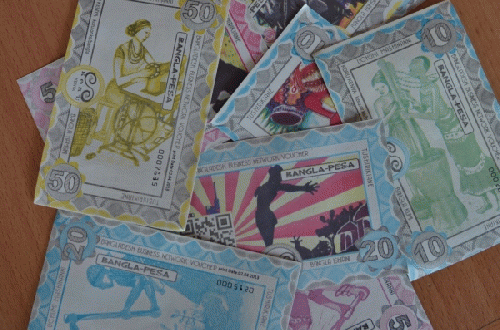Former Peace Corps volunteer Will Ruddick and several residents of Bangladesh, Kenya, face a potential seven years in prison after developing a cost-effective way to alleviate poverty in Africa's poorest slums. Their solution: a complementary currency issued and backed by the local community. The Central Bank of Kenya has now initiated charges of forgery.
Complementary currencies can help eradicate poverty.
Proving that may be
difficult in complex economies, due to the high number of factors influencing
outcomes. But in an African slum with little of the national currency
available, supplying residents with an alternative currency has a positive
effect that is obvious, immediate and incontrovertible.
This
was demonstrated when Will Ruddick, an American physicist, economist
and former Peace Corps volunteer, introduced a complementary currency into a
Kenyan slum called Bangladesh, near the coastal city of Mombasa. Will's local
development organization, Koru-Kenya, worked
with over one hundred small business owners in Bangladesh, who agreed to give
each other the equivalent of 400 shillings (about --3.5 or $4.60) in mutual
credit in the form of business vouchers called Bangla-Pesa. Half of the vouchers would be
available for spending on each others' products and services, and half would be
spent into the community on public projects such as waste collection and health
services. Allocation decisions were
democratic and transparent, and the new currency was backed entirely by the
community's own resources and insured by a system of group guarantors, not by
the Kenyan government or a development agency.
The project was launched on May 11, 2013. The immediate effect was an increase in sales
of 22%. That meant increasing incomes and purchasing power by 22%. These exchanges were of goods and services
that without the additional currency would have been thrown away or gone to
waste, not because they were unmarketable but because potential customers did
not have the money to buy them.
Introducing Bangla-Pesa worked to move the economy forward at full
capacity, connecting the community to its own resources when the only things
lacking were those slips of paper called "money." A compelling video on the
project is here.
The successful
Kenyan experiment quickly earned endorsements from
the United Nations, The Hague and the International Reciprocal Trade Association.
Indeed, no other poverty alleviation or local governance program can compete
with the cost-effectiveness of this approach, which is easily replicable in poor
communities across Africa. The plan was to expand it to other villages in a
democratic grassroots fashion so that it could provide a local medium of
exchange for people throughout the continent. This would be done via mobile
phones with a system provided by Community Forge, an organization
based in Geneva that supports the development of community currencies
worldwide.
But
that plan was unexpectedly interrupted on May 29th, when Will and
five other project participants were arrested by Kenyan police and thrown in
jail. Besides Will, who is married to a
Kenyan aid worker and is a new father, the others include local community business owners who are parents and
grandparents, a youth activist, a volunteer mother, and the caretaker
of seven orphan children.
The
police at first accused the group of plotting a terrorist overthrow of the government,
claiming that Bangla-Pesa was linked to the MRC, a terrorist secessionist group.
When that link was easily disproven, the Central Bank of Kenya was called in
and charges of forgery were formally placed. Will and his fellow suspects have been released for
now on a bail of EUR 5,000 and await trial on July 17th. If convicted, they face
seven years in a Kenyan prison.
Despite these perilous circumstances,
Will remains optimistic. "The exciting
thing," he says, "is that these systems really do show a means of poverty
reduction - and my hope is that after this case we'll be allowed to spread them
to slums across Kenya. There have been
years of precedent for Complementary Currencies as a solution to poverty, and today
there is no doubting it."
Successful Precedents from
Switzerland to Brazil
(Note: You can view every article as one long page if you sign up as an Advocate Member, or higher).






